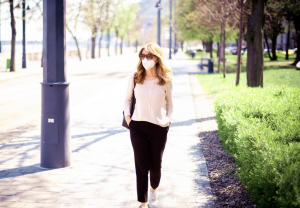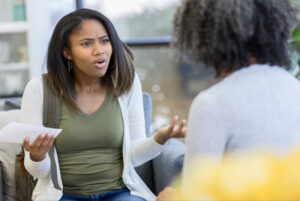Everyone is struggling to cope during these unprecedented times. 
The second spike that was predicted for winter has already begun. We have no idea if and when a vaccine will be developed and then distributed. We are basically in the same alarming situation we were in when Covid first appeared in March and our future is still uncertain.
Over the last eight months, our vocabulary has even evolved to include new words to describe what we have been going through.
Some of them are clever and amusing: obsessively searching your device for information about the pandemic is called “doom scrolling.” Married couples who break up during quarantine are getting a “covidivorce.” But other terms acknowledge something serious and unsettling: Tom Steding, PhD declares that we are in a “psychodemic.” Lise Van Susteren, MD writes that we are suffering from “emotional inflammation.” In her book, Emotional Inflammation (which was written before the pandemic), Van Susteren writes:
A rising number of adults in the United States are troubled by a phenomenon they don’t know there’s a name for. It may be marked by a sense of agitation, foreboding, spiralling negative thoughts, sleep disturbances, and a sense of hardly recognizing the light- hearted, fun-loving people they used to be. It’s what I call “emotional inflammation,” and when I look around, hear the expressed thoughts of my patients, colleagues, and friends, and even consider times in my own life, it feels like we are in the midst of an epidemic of it.
There are signs everywhere that we are suffering from this. Recently, during an episode of Stephen Colbert, Dolly Parton’s spontaneous a cappella rendition of a classic melancholy bluegrass song brought Colbert to tears. As he wiped his eyes, he said, “Like a lot of Americans, I’m under a lot of stress right now.” Beth Evans, an artist whose cartoons take an honest look at anxiety and mental health issues, was touchingly candid on her Instagram account, bethdrawsthings, last week. Next to drawings of her character looking sad, she wrote:
Things haven’t been great… Every day is such a challenge at the moment… I guess this is me saying, “I don’t know.” I’m just messy, confused, sad, miserable and trying to navigate stuff a bit at a time. I’m sorry I can’t finish this comic on a bright and hopeful note—I just can’t put forth something like that right now.
I am certainly aware of this in my own life. I’ve had to quarantine since March, but I am fortunate to be in a bubble with my husband and a few of our close friends. With the improvement and availability of testing, family members have begun to visit us, which has been wonderful. But I am lonely for the ongoing contact with my friends and family, and the joking and affection that naturally occurs from hanging out together. I miss moving freely in the world. I am calm by nature, but now I am afraid and anxious and easily alarmed. My awareness of existential realities has been heightened.
This month, in an article in Vanity Fair, “The Forgotten F-Word in the Pandemic” (the word being “feel”) Monica Lewinsky wrote, “No matter the circumstances, virtually none of us have been immune to the anxiety, depression, fear, anger, and loneliness that’s been exacerbated or spread, just like the virus itself. And, yet, there’s been little guidance that has broken through the noise about how to handle those aspects of the pandemic.”
I try to be mindful and follow the suggestions for maintaining mental health that are being offered. I make an effort to be aware of what triggers my fear and anxiety. There are some that I consciously avoid: the news channels with “breaking news” enhanced by swirling graphics and dramatic music. Updates popping up on my phone notifying me about the latest political corruption, natural disaster, or death toll from Covid. But there are others that are real and part of my life: having to socially distance from my grandchildren, knowing people who are feeling isolated and depressed and not being able to hug them.
I pay attention to my feelings: anger, fear, stress, irritability, depression, sadness. Rather than judge myself, I try to have self-compassion for my emotional reactions to these difficult circumstances. I talk with friends, walk in nature, and stay engaged in constructive activities. I distract myself by reading, learning to cook, and following sports. But sometimes, these just don’t work. I acknowledge my emotions, but they still feel bad. I talk to friends, but there are times when FaceTime isn’t good enough. I watch sports, but the tension of championship games adds to my already intense emotions. Sometimes, it feels like what the character in bethdrawsthings expressed, “I don’t know.”
But then, the other night a movie came on and I ended watching it. It was one of those screenplays, based on a true story, about a competition where an underdog group of misfits overcomes tremendous odds to win in the end. I had seen it before and even when seeing it for the first time the ending had been entirely predictable. When I saw it in the theatre during “normal” times, I had the same dismissive reaction that the film critics did. But this time, as I sat in the darkened room and watched the judges reward the ragtag team of high school kids rather over the college teams from prestigious universities, tears streamed down my face. And it felt so good to be crying.
I’ve cried plenty over the last months, but this was different. I wasn’t crying because I was stressed or frightened or sad about bad things that were happening. I was crying because, in this movie, something decent and right had happened. And I have also felt happy during these times, but this was different than laughing at a comedian or cheering for a winning sports team. This was deeper and more meaningful. I was touched by the decency of people, the goodness of people, by what Abraham Lincoln called “the better angels of our nature.” It had been a long time since I’d had felt this. This is what had been missing from my life.
I know that there are a lot of people who are feeling as I do.
During this “psychodemic,” we are all suffering from “emotional inflammation” exacerbated by the traumatic events of our current lives. The CDC states, “Traumatic events are marked by a sense of horror, helplessness, serious injury, or the threat of serious injury or death. Traumatic events affect survivors, rescue workers, and the friends and relatives of victims who have been involved. They may also have an impact on people who have seen the event either firsthand or on television.” Right now, that’s pretty much all of us. Our reactions to trauma tend to overshadow our positive feelings about life and our belief in people. But it is important for us to experience those feelings, especially now, so that our lives will be emotionally balanced. It is a part of ourselves that we need to stay in touch with and preserve in order to maintain “the better angels of our nature” and support those in our fellow human beings.

